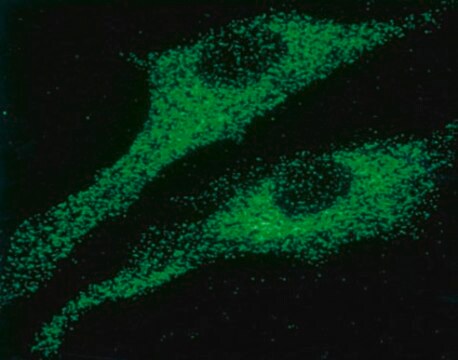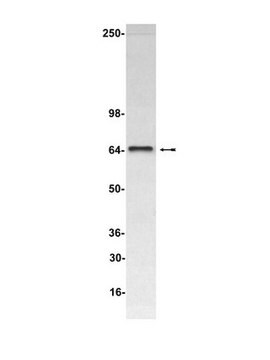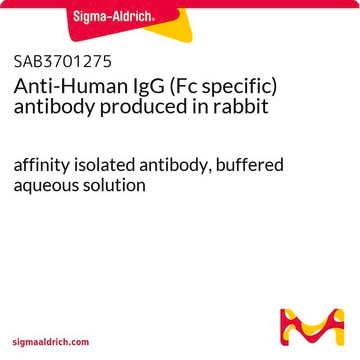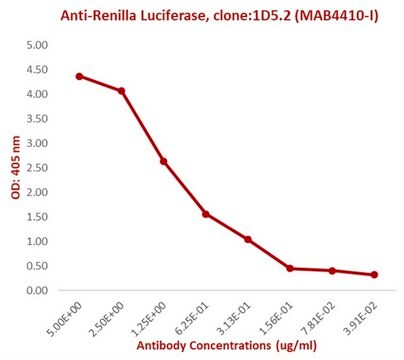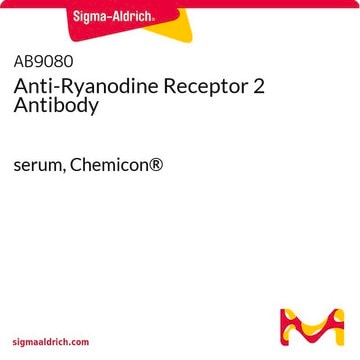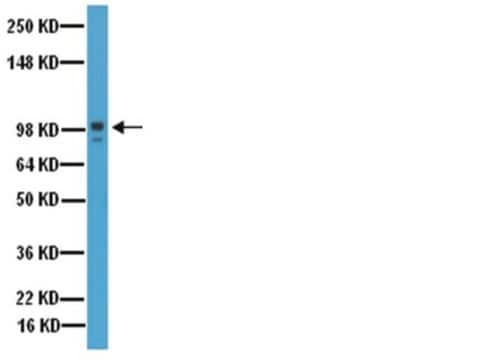MAB4400
Anti-Renilla Luciferase Antibody, clone 5B11.2
ascites fluid, clone 5B11.2, Chemicon®
Sign Into View Organizational & Contract Pricing
All Photos(1)
About This Item
UNSPSC Code:
12352203
eCl@ss:
32160702
NACRES:
NA.41
Recommended Products
biological source
mouse
Quality Level
antibody form
ascites fluid
antibody product type
primary antibodies
clone
5B11.2, monoclonal
species reactivity (predicted by homology)
all
manufacturer/tradename
Chemicon®
technique(s)
ELISA: suitable
neutralization: suitable
western blot: suitable
isotype
IgG1
UniProt accession no.
shipped in
dry ice
target post-translational modification
unmodified
General description
Renilla luciferase is a monomeric, bioluminescent protein derived from the sea pansy (Renilla reniformis). Renilla luciferase is often used as a reporter gene in sudies of gene expression or interaction. The 36 kDa enzyme catalyzes oxidation of the substrate coelenterazine to coelenteramide, resulting in the production of visible light. Renilla luciferase is not the same as luciferase from fireflies (Photalis pyralis) nor does it recognize the same substrates, so both enzymes can be used simultaneously in the same assay.
Specificity
Renilla luciferase
Immunogen
Renilla luciferase GST fusion protein
Application
Detect Renilla Luciferase using this Anti-Renilla Luciferase Antibody, clone 5B11.2 validated for use in ELISA, FUNC, NEUT & WB.
Research Category
Epitope Tags & General Use
Epitope Tags & General Use
Research Sub Category
Epitope Tags
Epitope Tags
Western Blot:
A previous lot of this antibody was used in WB.
EIA:
A previous lot of this antibody was used in ELISA.
Neutralization:
A prevous lot of this antibody was used in NEAT.
Optimal working dilutions must be determined by end user.
A previous lot of this antibody was used in WB.
EIA:
A previous lot of this antibody was used in ELISA.
Neutralization:
A prevous lot of this antibody was used in NEAT.
Optimal working dilutions must be determined by end user.
Target description
36 kDa
Physical form
Mouse monoclonal IgG1 Ascites.
Unpurified
Storage and Stability
Stable for 1 year at -20ºC in undiluted aliquots from date of receipt.
Handling Recommendations: Upon receipt, and prior to removing the cap, centrifuge the vial and gently mix the solution. Aliquot into microcentrifuge tubes and store at -20°C. Avoid repeated freeze/thaw cycles, which may damage IgG and affect product performance.
Handling Recommendations: Upon receipt, and prior to removing the cap, centrifuge the vial and gently mix the solution. Aliquot into microcentrifuge tubes and store at -20°C. Avoid repeated freeze/thaw cycles, which may damage IgG and affect product performance.
Analysis Note
Control
Renilla
Renilla
Other Notes
Concentration: Please refer to the Certificate of Analysis for the lot-specific concentration.
Legal Information
CHEMICON is a registered trademark of Merck KGaA, Darmstadt, Germany
Disclaimer
Unless otherwise stated in our catalog or other company documentation accompanying the product(s), our products are intended for research use only and are not to be used for any other purpose, which includes but is not limited to, unauthorized commercial uses, in vitro diagnostic uses, ex vivo or in vivo therapeutic uses or any type of consumption or application to humans or animals.
Not finding the right product?
Try our Product Selector Tool.
Storage Class Code
11 - Combustible Solids
WGK
WGK 1
Flash Point(F)
Not applicable
Flash Point(C)
Not applicable
Certificates of Analysis (COA)
Search for Certificates of Analysis (COA) by entering the products Lot/Batch Number. Lot and Batch Numbers can be found on a product’s label following the words ‘Lot’ or ‘Batch’.
Already Own This Product?
Find documentation for the products that you have recently purchased in the Document Library.
Replication competent molecular clones of HIV-1 expressing Renilla luciferase facilitate the analysis of antibody inhibition in PBMC.
Edmonds, TG; Ding, H; Yuan, X; Wei, Q; Smith, KS; Conway, JA; Wieczorek, L; Brown et al.
Virology null
Jaume Lillo et al.
International journal of molecular sciences, 22(16) (2021-08-28)
Cannabinoids have been reported as orexigenic, i.e., as promoting food intake that, among others, is controlled by the so-called "hunger" hormone, ghrelin. The aim of this paper was to look for functional and/or molecular interactions between ghrelin GHSR1a and cannabinoid
Maija Pollari et al.
PLoS pathogens, 16(10), e1008965-e1008965 (2020-10-09)
In this study, we demonstrate a novel pro-viral role for the Nicotiana benthamiana ARGONAUTE 1 (AGO1) in potyvirus infection. AGO1 strongly enhanced potato virus A (PVA) particle production and benefited the infection when supplied in excess. We subsequently identified the
Veronica Di Antonio et al.
Microorganisms, 9(5) (2021-05-01)
Human cytomegalovirus (HCMV) genome replication is a complex and still not completely understood process mediated by the highly coordinated interaction of host and viral products. Among the latter, six different proteins form the viral replication complex: a single-stranded DNA binding
Yukichi Fujikawa et al.
The Plant journal : for cell and molecular biology, 52(1), 185-195 (2007-07-31)
We developed a split luciferase complementation assay to study protein-protein interactions in Arabidopsis protoplasts. In this assay, the N- and C-terminal fragments of Renilla reniforms luciferase are translationally fused to bait and prey proteins, respectively. When the proteins interact, split
Our team of scientists has experience in all areas of research including Life Science, Material Science, Chemical Synthesis, Chromatography, Analytical and many others.
Contact Technical Service